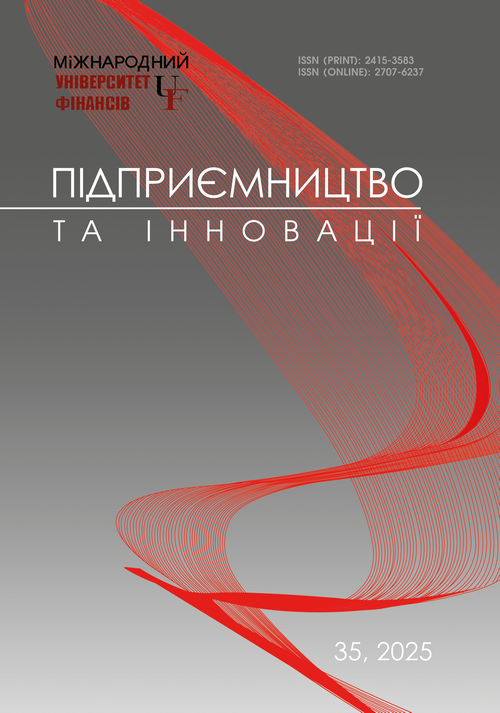ІННОВАЦІЙНІ СТРАТЕГІЇ УПРАВЛІННЯ ПІДПРИЄМСТВАМИ ЯК КЛЮЧОВИЙ ФАКТОР СТАЛОГО РОЗВИТКУ В УМОВАХ ЦИРКУЛЯРНОЇ ЕКОНОМІКИ
Анотація
У статті проаналізовано основні наукові підходи до дослідження тенденцій розвитку циркулярної економіки, а також окреслено проблематику стратегічного управління інноваційною діяльністю в умовах переходу до циркулярної моделі господарювання. Запропоновано методичний підхід до підвищення ефективності стратегічного управління інноваційною діяльністю, що ґрунтується на трансформації викликів через використання переваг циркулярної економіки. Перетворення таких викликів, як дефіцит ресурсів, зростаючі економічні вимоги та швидкий технологічний прогрес, на можливості циркулярної економіки досягається завдяки впровадженню ресурсозберігаючих технологій, розробці замкнених виробничих циклів, мінімізації відходів та ефективному управлінню життєвим циклом продуктів. Наголошено на важливості формування екосистеми раціонального використання ресурсів, що відображає глобальні тенденції сталого розвитку, де економія ресурсів і збереження навколишнього середовища стають фундаментом світової економіки та ключовим фактором конкурентоспроможності підприємств.
Посилання
Артемов В.О., Бахчеван Е.В., Бочко О.А. Циркулярна економіка – виклик сучасності Економіка та суспільство. 2023. Вип. 58. URL: https://economyandsociety.in.ua/index.php/journal/article/view/3276 (дата звернення: 28.02.2025).
Вороніна В.Л. Стратегічне управління інноваційним розвитком на державному рівні. Нобелівський вісник. 2021 № 1(14). С. 25–34. URL: https://econforum.duan.edu.ua/index.php/uk/arkhiv/115-2020-1/130-zhurnal-nobelivskyi-visnyk-2021-1-14 (дата звернення: 26.02.2025).
Вострякова В.І. Інноваційне бізнес-моделювання в управлінні сталою біоекономічною трансформацією підприємств АПК. Київський економічний науковий журнал. 2024. № 4. С. 31–41. URL: https://journals.kymu.kyiv.ua/index.php/economy/article/view/94 (дата звернення: 26.02.2025).
Єфанов В.А. Використання принципів циркулярної економіки та замкнутих циклів у виробництві для мінімізації відходів та зменшення навантаження на навколишнє середовище. Економіка та суспільство. 2024. Вип. 62. URL: https://economyandsociety.in.ua/index.php/journal/issue/view/62 (дата звернення: 25.02.2025).
Злотнік М.Л., Мельник О.Г. Стратегічне управління впровадженням принципів циркулярної економіки на вітчизняних підприємствах. Підприємництво та інновації. 2020. Вип. 12 С. 119–122. URL: http://ei-journal.in.ua/index.php/journal/article/view/317 (дата звернення: 27.02.2025).
Клєвцєвич Н.А Застосування бізнес моделей економіки замкнутого циклу в українських реаліях. Економічний простір. 2022. № 180. С. 58–63, с. 61–62. URL: https://prostir.pdaba.dp.ua/index.php/journal/article/download/1113/1072/ (дата звернення: 25.02.2025).
Кононенко Л.В., Сисоліна І.П., Сисоліна Н.П. Формування стратегії підприємствами агропромислового комплексу в умовах циркулярної економіки. Економічний простір. 2023. № 184. С. 91–94. URL: https://prostir.pdaba.dp.ua/index.php/journal/article/view/1238 (дата звернення: 24.02.2025).
Музиченко-Козловська О.В. Стратегія покращення інноваційної діяльності підприємства на засадах сталого розвитку. ECONOMICS: time realities. 2024. № 2 (72). С. 30–38. URL: https://economics.net.ua/files/archive/2024/No2/30.pdf (дата звернення: 24.02.2025).
Стоянова-Коваль С.С., Слуцький Є.В., Варгатюк М.О. Тенденції розвитку циркулярної економіки в світі. Економічний простір. 2023. № 183. С. 114–118, с. 117. URL: https://prostir.pdaba.dp.ua/index.php/journal/article/view/1256 (дата звернення: 27.02.2025).
Artemov V.O., Bakhchevan E.V., Bochko O. A. (2023) Tsyrkuliarna ekonomika – vyklyk suchasnosti [Circular economy is a challenge of our time] Ekonomika ta suspilstvo – Economy and society. vol. 58. Available at: https://economyandsociety.in.ua/index.php/journal/article/view/3276 (accessed February 26, 2025).
Voronina V.L (2021) Stratehichne upravlinnia innovatsiinym rozvytkom na derzhavnomu rivni [Strategic management of innovation development at the state level]. Nobelivskyi visnyk – The Nobel Bulletin, no. 1(14), pp. 25–34. Available at: https://econforum.duan.edu.ua/index.php/uk/arkhiv/115-2020-1/130-zhurnal-nobelivskyi-visnyk-2021-1-14 (accessed February 26, 2025).
Vostriakova V.I. (2024 Innovatsiine biznes-modeliuvannia v upravlinni staloiu bioekonomichnoiu transformatsiieiu pidpryiemstv APK [Innovative business modeling in the management of sustainable bioeconomic transformation of agricultural enterprises]. Kyivskyi ekonomichnyi naukovyi zhurnal – Kyiv Economic Scientific Journal. no. 4 pp. 31–41. Available at: https://journals.kymu.kyiv.ua/index.php/economy/article/view/94 (accessed February 26, 2025).
Iefanov V. A. (2024) Vykorystannia pryntsypiv tsyrkuliarnoi ekonomiky ta zamknutykh tsykliv u vyrobnytstvi dlia minimizatsii vidkhodiv ta zmenshennia navantazhennia na navkolyshnie seredovyshche [Using the principles of circular economy and closed loops in production to minimize waste and reduce the burden on the environment]. Ekonomika ta suspilstvo – Economy and society, vol. 62. Available at: https://economyandsociety.in.ua/index.php/journal/issue/view/62 (accessed February 25, 2025.)
Zlotnik. M. L., Melnyk O. H. (2020) Stratehichne upravlinnia vprovadzhenniam pryntsypiv tsyrkuliarnoi ekonomiky na vitchyznianykh pidpryiemstvakh [Strategic management of the implementation of circular economy principles at domestic enterprises]. Pidpryiemnytstvo ta innovatsii – Entrepreneurship and innovation, vol. 12, pp. 119–122.
Klievtsievych N. A. (2022) Zastosuvannia biznes modelei ekonomiky zamknutoho tsyklu v ukrainskykh realiiakh [Application of business models of the closed-loop economy in Ukrainian realities]. Ekonomichnyi prostir – Economic space no. 180, pp. 58–63. Available at: https://prostir.pdaba.dp.ua/index.php/journal/article/download/1113/1072/ (accessed February 25, 2025).
Kononenko L. V., Sysolina I. P., Sysolina N. P. (2023) Formuvannia stratehii pidpryiemstvamy ahropromyslovoho kompleksu v umovakh tsyrkuliarnoi ekonomiky [Strategy formation by agricultural enterprises in a circular economy]. Ekonomichnyi prostir – Economic space no. 184, pp. 91–93. Available at: https://prostir.pdaba.dp.ua/index.php/journal/article/view/1238 (accessed February 24, 2025).
Muzychenko-Kozlovska O. V. (2024) Stratehiia pokrashchennia innovatsiinoi diialnosti pidpryiemstva na zasadakh staloho rozvytku [Strategy for improving the innovation activity of the enterprise on the basis of sustainable development] ECONOMICS: time realities, no. 2 (72), pp. 30–38. Available at: https://economics.net.ua/files/archive/2024/No2/30.pdf (accessed February 24, 2025).
Stoianova-Koval S. S., Slutskyi Ye. V., Varhatiuk M. O. (2023) Tendentsii rozvytku tsyrkuliarnoi ekonomiky v sviti [Circular economy development trends in the world]]. Ekonomichnyi prostir – Economic space no. 180 pp. 58–63. Available at: https://prostir.pdaba.dp.ua/index.php/journal/article/view/1256 (accessed February 27, 2025).



